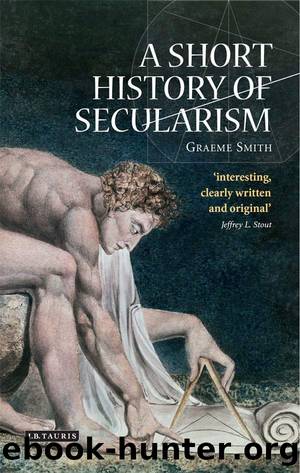A Short History of Secularism (I.B.Tauris Short Histories) by Graeme Smith

Author:Graeme Smith [Smith, Graeme]
Language: eng
Format: epub
ISBN: 9780857731371
Publisher: Bloomsbury Publishing
Published: 2007-11-27T18:30:00+00:00
The Power of the Supernatural in the Middle Ages
Whilst it might be agreed that church attendance was not universal, nor always especially devout, those who want to argue that we now live in a secular age highlight the shift away from belief in the supernatural. In the Middle Ages, people believed in the power of demons, the healing abilities of relics and the protection offered by dead saints. In fact, for many commentators it is saints and shrines which are the essence of medieval popular religion. The adoration and invocation of saintly assistance, combined with pilgrimage and the promise of pilgrimage to shrines, were at the heart of the practice of Christianity in the Middle Ages and beyond. Compared with this medieval dialogue with the supernatural, we are a secular age devoid of any appreciation of the importance of the afterlife and its continuing influence on our affairs.
Such general assertions are to be taken seriously. We shall see that in some senses they are correct and an important contrast should be drawn. But we also need to be aware that the picture is far more complex than a simple supernatural/natural dualism might suggest. For example, we should not forget the 70â80 per cent of contemporary Western people who state in surveys that they believe in God. This may well not be an orthodox Christian doctrine of God they are assenting to; in fact, it is a view of the Divine which will be packed full of many quirky and unorthodox beliefs. But when people say they believe in God, they will at least mean something supernatural. Those who want to deny any belief in the supernatural will say they do not believe in God. So one immediate and important qualification to the secular picture of contemporary society is the frequently recorded view that people believe something supernatural exists. It is with similar caution and attention to detail that we need to examine medieval beliefs in the supernatural.
It is fair to say that medieval belief in the supernatural was all-pervasive. It had two elements. The first was the threat to safety and security posed by malevolent spirits. Actions had to be taken to rid the home and local area of demons. One very important community event which had as its aim the banishing of demons from the local community was the Rogationtide procession. It was a community event which everyone had to attend, although that does not mean it was a deeply sacred event. It may be the procession had the same status as the celebration of Christmas, Thanksgiving or even Harvest, a popular festival meaning different things to different people. The purpose of the procession was to drive malevolent spirits out of the parish. To this end banners were carried, bells rung and the litany of the saints sung around the boundaries of the parish. A cross was carried symbolizing the victory of Christ over the devil. At certain points around the parish boundary, portions of the Gospels were read. This would drive out demons from the parish and bring fertility to the fields.
Download
This site does not store any files on its server. We only index and link to content provided by other sites. Please contact the content providers to delete copyright contents if any and email us, we'll remove relevant links or contents immediately.
| Africa | Americas |
| Arctic & Antarctica | Asia |
| Australia & Oceania | Europe |
| Middle East | Russia |
| United States | World |
| Ancient Civilizations | Military |
| Historical Study & Educational Resources |
The Third Pole by Mark Synnott(682)
Money for Nothing by Thomas Levenson(632)
Christian Ethics by Wilkens Steve;(575)
The Economist (20210109) by calibre(571)
Made in China by Anna Qu(544)
100 Posters That Changed The World by Salter Colin T.;(502)
Reopening Muslim Minds by Mustafa Akyol(492)
Routledge Handbook of Contemporary India by Knut A. Jacobsen(480)
The Irish Buddhist by Alicia Turner(478)
Nonstate Warfare by Stephen Biddle(471)
Culture by Terry Eagleton(465)
The Great Pyramid Void Enigma by Scott Creighton(456)
The Age of Louis XIV: The Story of Civilization by Will Durant(454)
Ideology by Eagleton Terry;(443)
The Shortest History of China by Linda Jaivin(435)
Objects of Vision by Saab A. Joan;(430)
Banaras: CITY OF LIGHT by Diana L. Eck(429)
The Jews of Silence: A Personal Report on Soviet Jewry by Elie Wiesel(426)
Sybille Bedford by Selina Hastings(416)
